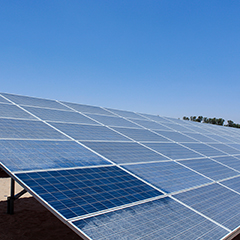Significant yield losses caused by sand and fine dust
1 December 2015 – In many regions of the world, sand and fine dust cause photovoltaic power plants to experience considerable yield losses. Although the manual or automatic cleaning of modules is intended to remedy this situation, it may actually damage the solar panels’ glass surfaces. The Photovoltaik-Institut Berlin (PI Berlin) has developed a number of stress tests that closely simulate practical conditions to investigate the effect of cleaning equipment on module surfaces. In addition to recommending suitable cleaning methods, the tests provide module manufacturers with evidence that the surfaces of their modules are resistant to cleaning.
Press photos are available at
www.pi-berlin.com/en/pv-cleaningrobots.html
A sandstorm sweeping across a PV power plant may cause all the modules to become completely covered with sand, leading to a 100 percent loss in yield. Moreover, even partially covered modules often result in considerable reductions in output. Here, a sharp localised increase in the temperature of the non-soiled parts of the modules frequently inflicts damage due to partial shading. These hotspots may precipitate further losses in yield or, in isolated cases, even lead to dangerous deterioration, such as burnt-through module back sheets.
Cleaning robots cause surface damage
“PV cleaning robots are increasingly being used in desert regions. This is why module manufacturers responding to calls for tender have recently started to be required to present confirmation from an independent testing institute that the surface of their solar modules is resistant to cleaning,” explains Dr Juliane Berghold, Head of Module Technology and Research at PI Berlin. “A variety of cleaning solutions are available on the market, ranging from robots that clean the modules with water to dry-cleaning systems that use air pressure or brushes. We simulate various cleaning methods on purpose-built test configurations as closely as possible to how they are performed in practice. These tests very often reveal, for example, that over time cleaning damages the antireflection coating used on solar modules, especially if the modules were not coated using a vacuum deposition process. In some cases, however, even the entire glass surface becomes scratched.”
Operators wish to protect themselves
In addition to advising project developers and operators about which cleaning method is suitable for specific module types, PI Berlin regularly performs tests for cleaning robot producers. For example, the company recently tested a water-free cleaning process for leading PV cleaning systems manufacturer Ecoppia. PI Berlin’s engineers and researchers identified which module types are suitable for this cleaning method by conducting tests in its Berlin-based laboratory and in the field. Four different types of module were subjected to stress tests as they were cleaned under test conditions that mirrored the future operating conditions of a planned 40 megawatt project in south-east Israel.
“As the operator, we wanted to make sure that our envisaged water-free cleaning process would not cause any harm to our PV power plant. This is why we called on the services of PI Berlin’s experts. We knew that instead of simply conducting tests under standard conditions, they perform stress tests that closely simulate actual conditions,” comments Esther Westreich, CEO of Global Sun Operation and Maintenance Ltd., operator of the PV power plant. The operating company is part of the Arava Power Group, one of the biggest project developers in Israel.
PI Berlin has already provided support for projects with a total rated output of over two gigawatts (GW) worldwide, including numerous projects making use of automatic module cleaning systems. With its interdisciplinary team of researchers and engineers, the company provides independent, expert advice on designing, constructing and operating PV power plants. It has its own test laboratories and a photovoltaics R&D department. The institute was established nine years ago by PV experts Prof. Dr Stefan Krauter, Sven Lehmann and Paul Grunow, who was also one of the founders of Solon and Q CELLS.


























